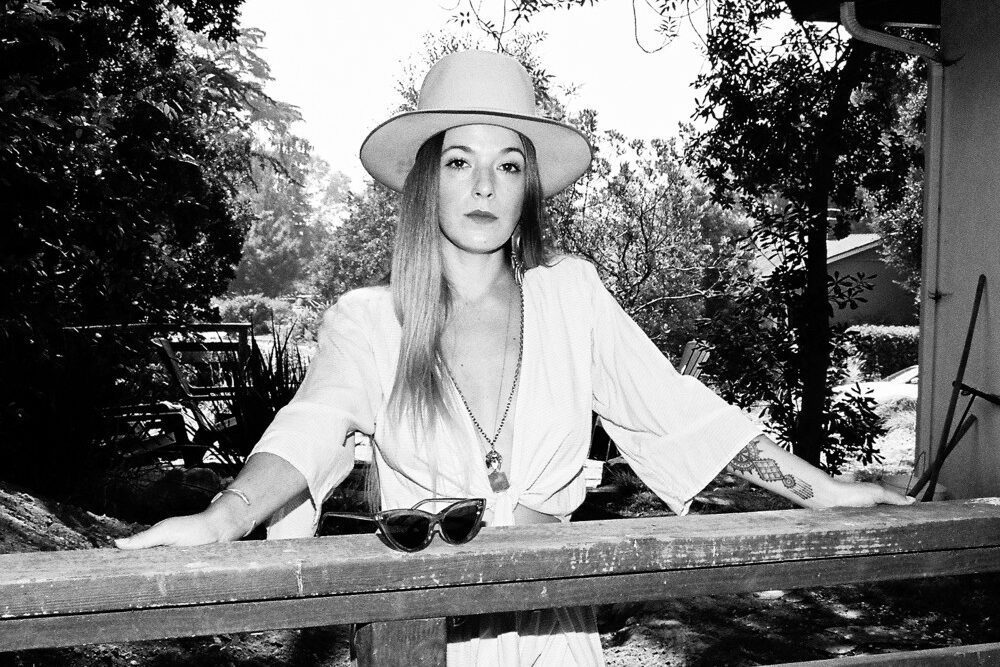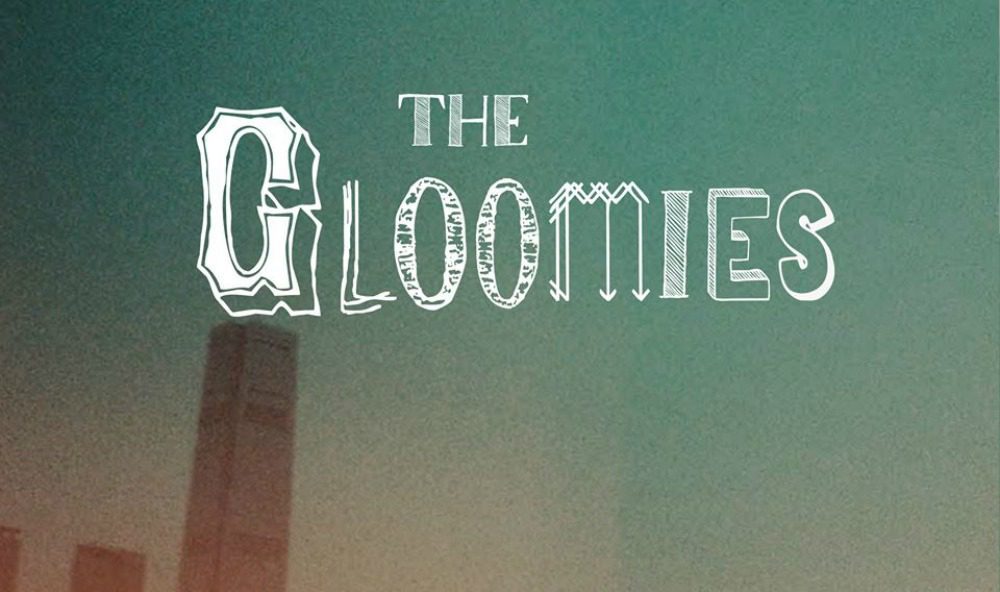

“Purpose is a feeling. It’s not a goal,” stresses Jocelyn Mackenzie. The New York singer-songwriter, formerly of acclaimed indie-folk trio Pearl and the Beard, speaks emphatically about her solo work and the long, winding road it took to get here. Her debut album, PUSH, splits open with gushing string arrangements, bound tightly like holiday ribbon around stories of pain, trauma, and eventually “radical self-love,” a theme she never expected to emerge.
With some songs dating back more than a decade, the process evoked plenty of anxiety about what it all would ultimately mean. Her psychic medium mentor (more on that later) was quick to remind her that one’s purpose is “how you feel, not what your goals are,” she tells Audiofemme. “PUSH has been a goal of mine, [but] the purpose of it is to feel connected to other people… I continue to do that through this music. The great thing about recorded music is that it’s timeless. It travels through space and time. Someone across the world can be listening to this 25 years from now. There’s an infinity to this process.”
Co-produced with Sam McCormally, PUSH is like thunder cracking across the sky. With the help of five composers, who were given total creative control over their arrangements, Mackenzie’s lyrics are given a life they may not have had otherwise. “Audubon Garden,” for example, gurgles with a Shovels & Rope swampiness, Mackenzie dishing up one of the defining vocal performances of the bunch. Composer Franz Nicolay leans into devilish rhythms that seem to inject a bit of crackling mysticism. Later, closing number “Little Islands” ebbs and flows, a dream-like quality rising like fog ─ owed to former bandmate Emily Hope Price’s fragile, stirring arrangement.
Mackenzie had been stockpiling demos for quite some time, “not really knowing what I was going to do with them,” she says. Once she got the itch to take that next step in the album creation process, she handed out 19 demos to a small composer pool to see which songs resonated most with them. “I was really letting the album create itself. I couldn’t be more thrilled,” she says. “For the most part, I wanted the composers to do their thing. They would send me a draft, and I would [sign off].”
Of course, she doesn’t undersell her personal expedition through pain to enlightened healing, and hopes listeners will relate to the catharsis she experienced in finally putting the songs to tape. “The album wasn’t really written in response to anything in the exterior world. It was a lot of reflections on my inner world,” she says. “Have I healed? You know what, fuck it, I think I have. I think there’s always new healing to be found. I also think healing, for me, gets more and more subtle the more layers you work through.”
One of the most traumatic layers Mackenzie sifted through was a miscarriage in her early 20s. “That was very, very painful,” she admits. Now that she’s done plenty of songwriting about it, namely with the gut-punching “Primate,” she “can’t say that wound is closed, and it’ll never open again. But it resurfaces in subtler and subtler ways. I’m 37, and sometimes, I’ll imagine: what if I had a 12-year-old kid? It’s not like it ever goes away and that healing is ever finished, but I think I’ve learned how to live with the subtleties of it in a more sustainable way… A big part of it for me is treating myself with love. If I have an emotional moment when something comes up, and I feel untethered, to go, ‘what’s the loving way to treat myself so I can move through this and not blame myself?’”
With “Look at Me,” she further casts out trauma, firmly confronting sexual assault but also learning to forgive. “It’s the kind of thing that happens all the time. I don’t really know a single female-identifying friend of mine who hasn’t experienced it, as well as some male and non-gender conforming friends,” she explains. Forgiving her abuser became Mackenzie’s way of breaking the cycle of generational trauma even further “by not resenting this person,” rather than be fueled by unbridled rage. “I won’t hold your pain, won’t turn it into mine/I’ll heal seven generations at the same time,” she crows through Price’s needle-pricking arrangement. She says she had to “make the choice to face the fear and the hurt” so she wouldn’t continue such a vicious, relentless cycle.
“It’s been scary, but it’s been absolutely healing. It’s not up to me to make that choice for anybody else,” she adds. “The way Emily treated [this song] with such love allowed me to look at my experience from an elevated standpoint and say, ‘Yes, I went through this thing that was completely horrifying. The person who did this to me went through horrible things themselves.’ And that’s not to say I condone that behavior. I do not… but I can forgive it because I understand… what I experienced was a diminished form of abuse of what they experienced. Forgiveness and condoning are two different things.”
As heavy as PUSH often is, Mackenzie makes sure to inject a bit of levity through some twisted, dark humor. “Sick & Suffering” is a prime example: “Oh the whisker I grow, it won’t bother me no more/When it grows six feet under ground,” she sings. “And the shoes that I own that pinch my big toe/Won’t pinch the toe the tag hangs around.” Over McCormally’s off-kilter string arrangement, Mackenzie “acknowledges that my brain is wired for the worst case scenario,” she says with a laugh. “It’s constantly telling me it’s the end of the world and I’m going to die alone. I’m incredibly insecure. Sam’s arrangement really made it funnier for me. Humor can be so important in healing.”
“There She Goes” swerves back to a more serious mood, handling a breakup with an ex who came out as transgender and was faced with ostracization from their family and friends. With Patrick Breiner’s unsettling, reality-blurring arrangement that feels like something out of a Tim Burton film, Mackenzie approaches the topic with the utmost care, focusing less on her own heartache and more on the pain her ex endured after coming out. “A lot of pain could have been avoided if our world and society supported transgender people in a better way, so they were never put into this position to begin with,” Mackenzie points out.
“I know this piece of you is true/So go and get her ‘fore she gets the best of you,” she sings, the tension slowly building. “Everyone is worthy of patience/Everyone is worthy of love,” she continues, not letting bitterness drown her words. “But love can’t come from anybody ’til you give it to yourself.”
“I was overwhelmed with glee when I heard this arrangement,” Mackenzie says. “Patrick is an incredible, nuanced composer. When I told the composers to do whatever they wanted, Patrick took the prompt and ran with it the farthest, and I was so excited he did.”
The whimsical follow-up, “Belly of the Beast,” comes out of nowhere, its throwback style quite a musical treat. Mackenzie was doing dishes one day when it hit her as a bolt of lightning. “I imagined it being sung by a gay barber shop quartet,” she remembers. Two gay friends, Anthony Napoletano and Mike Nelson, supply plush vocal work. Unlike the rest of the album, the string arrangement (courtesy of Nicolay) is kept sparse, giving the track an a cappella vibe.
“[This song] is really about the music industry eating you alive,” offers Mackenzie, adding that despite the amazing promise it holds for artists, the industry is “still feeding itself on souls,” she chuckles. “I believe music is our divine birthright, and the industry took it and commoditized it. It’s very challenging. We live in a capitalist society. There’s no shame in needing money.”
Macknezie’s journey with PUSH is undeniably hitched to her spiritual awakening over the last two years. Growing up, she was always an extra-sensory kind of person, privy to feelings far beyond the here and now ─ but “there was a single day when I had my awakening, and it was a total shift for me, as far as being a human being in this world,” she remembers of the fateful day everything changed: July 28, 2019. “I’ll never forget it. It was amazing, but also really intense.”
Mackenzie says, “For years and years before that, I had experienced a lot of synchronicity” – from finding collaborators who would become bandmates in Pearl and the Beard, to meeting legendary musician Ani DiFranco (who would eventually release PUSH via her label, Righteous Babe Records). Mackenzie began a deep-dive into YouTube’s psychic medium world and discovered Nicky Sutton; one video in particular struck her, and Mackenzie sought out a local circle to entertain the possibility that she was a medium, as well.
She found a meet-up the very next day, two blocks away from her day job, and 15 minutes after her shift. Her destiny could not have been more aligned. “I had had plans that night that got canceled. So, I went and showed up,” Mackenzie recalls. “I sat down, and the teacher was like, ‘Okay, now you’re going to give each other readings.’ I raised my hand and said, ‘I’ve never done this before.’ She laughed in my face and said, ‘Not in this lifetime, honey.’ That night, I gave my first two readings. She gave me some tools and said, ‘Trust yourself.’ After that, it was like a light switch flipped on. I ended up connecting with a really amazing mentor who has really trained me. It’s been incredibly enriching and a beautiful gift.”
Humanity has a long history of seeking out such avenues to connect with the dead, the afterlife, and deeper, more sensitive emotional ties. “Music is something that does that for us,” Mackenzie notes of music’s innate divinity. “It’s not all that radical to say music is a spiritual experience. It’s immaterial. You can’t put a price on it. Even when you’re at a show ─ sure, you pay for the price of a ticket ─ but the experience… what’s the price you’d pay for your favorite song if it had never been written? You can’t put a price on that.”
Now, as PUSH flies wild and free in the world, Mackenzie takes stock of what the process of making the album has taught her. “I’m more patient than I realized. I’ve always thought of myself as an instant gratification person. But this album has been a labor of love,” she offers. “I always believed it was possible to do whatever I want. I’ve always drank the Kool-Aid of the American dream. And I’ve wanted this for so long, and now it’s really happening. So many people helped. I’ve learned how to ask for help and get out of my own way. Everything is possible. We have to let it happen to us.”
Follow Jocelyn Mackenzie on Twitter and Instagram for ongoing updates.




